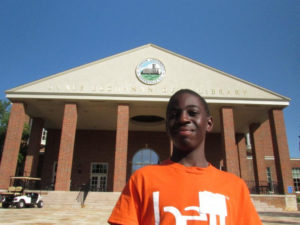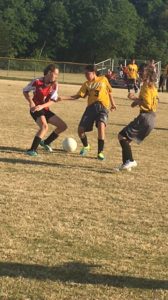
Brianna began the 2017-18 school year in sixth grade – for a second time. She was embarrassed and discouraged that her failing grades the year before meant she’d be repeating the year while many of her friends moved on. And her home life was no brighter. Her parents don’t value education nor were they able to meet her basic needs; many days, she came to school dirty, hungry, and in the same clothes she wore the previous day.
Early in the school year, the Early Warning and Response Team at her OnTrack Greenville middle school flagged her for their attention. They connected her with a Student Support Specialist from Communities in Schools – funded in part by the collective giving of GPP members – and she worked with Brianna to set an academic goal of passing all of her classes.
This attention and goal-setting was what Brianna needed to make the most of her time at school. During the 2016-17 school year, Brianna came to school focused each day, and with the support of other services, she’s happier and healthier than she’s ever been. She ended the sixth grade with all Cs and is proudly moving on to seventh grade.
This is one of hundreds of real stories of student success catalyzed or supported by OnTrack Greenville. Now that the second academic year of OnTrack is complete, some of the key elements of this unique partnership are demonstrating their merit and have partners all the more eager for outcome evaluation in January 2018. In the meantime, there are key areas of growth, success, and challenge worth reporting.
Collaboration. OnTrack Greenville may be the most ambitious and in depth collaboration our community has ever seen; partners are truly interdependent on each other for their day-to-day work and for the results. The work of the United Way as “backbone” organization (to use a phrase from Collective Impact literature) has been comprehensive and consistent, and some partners now confess to having been frustrated by how time consuming the “collaboration” part of collaboration was. But now that they are seeing results – which will hopefully be backed up by data – they acknowledge the impact it has had on their work.
“When the members of the partnership were all together over a period of months figuring out what our values and our guiding principles were going to be, the first one became that students are at the center. I am convinced that this is the reason this initiative has succeeded to the point that it has and continues to be moving in the right direction,” said one partner. “Having that as the overarching mantra forces different kinds of conversations and enables the group to tackle problems in a way that’s not organizationally self-centered.”
Some believe it’s changed the way they approach all community work. “Since being involved with OnTrack Greenville, we are being more intentional about collaboration and partnership. How can we partner with other folks who are doing this work? Instead of remaining in that silo of, ‘this is what we do,’ we are thinking of who else is doing work similar to ours? How can we work together? And work smarter? And work collaboratively?”
The many OnTrack Greenville partners now recognize that OnTrack Greenville staff at United Way aren’t just grants administrators. “They continue to play a critical role, from establishing a sustainability plan and governance structure, to advocating for ongoing federal funding through SIF, to liaising between implementation partners, the school district and schools to ensure we use data and learning to remain both adaptive to changes and coherent with the original OnTrack purposes and goals.”
Implementation. Although academic year one certainly had an impact, it was also a pilot of sorts as the many partners established and fine-tuned systems, understood how to work with each other, and acclimated themselves to the schools, students, and Early Warning and Response process. A process evaluation identified four key shifts taking place among the stakeholders throughout year two:
1. Moving from seeing broad, high level student data to using actionable data on specific students as a basis for engaging interventions and resources.
2. Moving from frequently siloed to collaborative engagement across organizations, systems, and sectors.
3. Moving from a linear understanding of success to a cyclical learning approach that expands impact.
4. Moving from operating from primarily an organizational or self-centered frame of reference to a student-centered frame of reference.
One example of adaptive learning is seen in the Greenville Health System School Based Health Center. The centers at each school are envisioned primarily as ways to address students’ health issues that are leading to absenteeism or difficulty in the classroom. Indeed, 90% of the students seen in the centers last year were able to return to class.

One of the OnTrack schools requested the SBHC to conduct sports physicals for students. The SBHC enthusiastically agreed, as many students from poverty cannot play sports because they do not have a sports physical. Over time, they learned that the physicals were of great benefit to the SBHC because by establishing trust through a non-threatening visit, the students and parents became aware and comfortable accessing the services. . Further, the GHS SBHC staff have a tremendous rapport with students and parents. For example, two students have contacted the nurse practitioner because of concerns about hurting themselves, and parents frequently contact staff with questions. As a result, referrals to the center from faculty and partner staff have doubled in year two; and because sports physicals were so easy to obtain, Berea Middle School reported having the highest number of students try out for both boys and girls basketball and named their first ever girls’ soccer team, which promotes student engagement and school spirit, and important part of keeping kids on track. Through this experience, the partners have learned how to market the services of the SBHC and increase parental consents allowing student to utilize services.
Evaluation. Evaluation of “what works” is fundamental to OnTrack. Are the interventions being conducted with fidelity to the model? Is each partner’s intervention having an impact on attendance, behavior, and core course performance? Is the full collaboration making a difference? What about the process of collaboration was effective?
At the beginning of this school year, each partner received the first implementation evaluation, which considers whether they are conducting the work as was originally envisioned. Partners found them to be extremely helpful and have used them for continuous improvement. As one partner said, “Implementation evaluation is the ‘secret sauce’ in a lot of ways.”
OnTrack Greenville staff explain, “Organizations rarely have the opportunity to have an implementation evaluation. Usually you’re five years into something before you have outcomes. You never look at what you’re doing along the way. The implementation evaluations are a huge asset for us to use to ensure we get to the outcomes that we set.”
Return on investment. Since its inception, OnTrack Greenville has been touted as having a significant return on investment. The very model of SIF funding means that the SIF dollars are leveraged three to one each year. And the investment of time in students’ lives are expected to pay dividends down the road.
During the past academic year, the United Way projected return on investment and found that if the on-time graduation rate for the class of 2022 is 100%, the students will see an annual earnings increase of $1.8 million, annual spending increase of $1.3 million, and increase in tax revenues of $441,000.
But there has been an immediate example of dollars leveraged in the four OnTrack Greenville schools. Because of the attention now directed at the White Horse Road area schools and the stronger connections between school and community, partnerships have increased exponentially. Three schools have received increased financial support from private donors for school uniforms, band, and other needs. Field trips to colleges, courts, and businesses are now available, as are after school supports and activities.
Challenges. The challenges of working in schools whose students are in poverty are constant, and the nature of collaboration brings its own challenges to the process. Three themes were prevalent in academic year two.
Loss of SIF funding. Throughout the year, in which congress and the White House administration changed leadership, it was anticipated that SIF funding might not be continued. OnTrack Greenville staff worked closely with staff from the Social Innovation Fund and stayed in communication with the congressional delegation. Nonetheless, the loss of funding was confirmed in late April, which means that SIF dollars will no longer be available to support the work for a fourth academic year. Funding is secure through the third programmatic year, 2017-2018.
Staff and volunteer leaders are developing a thoughtful plan for continuing and sustaining elements of OnTrack Greenville that impact students. This has always been a goal for OnTrack Greenville, and the loss of SIF just accelerates the planning timeline. Still, the uncertainty added stress for all staff during the year and created more work that was focused on money rather than students.
Staff turnover. With a scope as ambitious as OnTrack Greenville, numerous staff are involved. With so many staff in such diverse positions managed by different organizations, turnover is to be expected; several key staff positions changed in the past academic year, from one of the four principals to teen leadership teachers to a nurse practitioner. This was easier to handle in year two than year one since systems are in place and other staff were knowledgeable enough to fill in during the absence and train upon the positions’ replacement. But it did take time and resources to manage the transition.
Maintaining momentum. As one OnTrack Greenville staff member said, “Even though we started implementation in 2015, it feels for our stakeholders as if it has been a long time.” They sense an interest from the partners in “what’s next,” and while it’s always important to keep an eye on the future, they want to make sure stakeholders and partners stay focused on what’s immediately before them. Much of that may come from the initiative mindset that often pervades human service work. OnTrack Greenville is at a critical inflection point as the work transitions from the exciting start up and establishment of systems to lasting change in culture and the way schools and partners do business.
All indications point to the change being well underway. As one principal said recently, “We look at OnTrack Greenville as a part of us.”